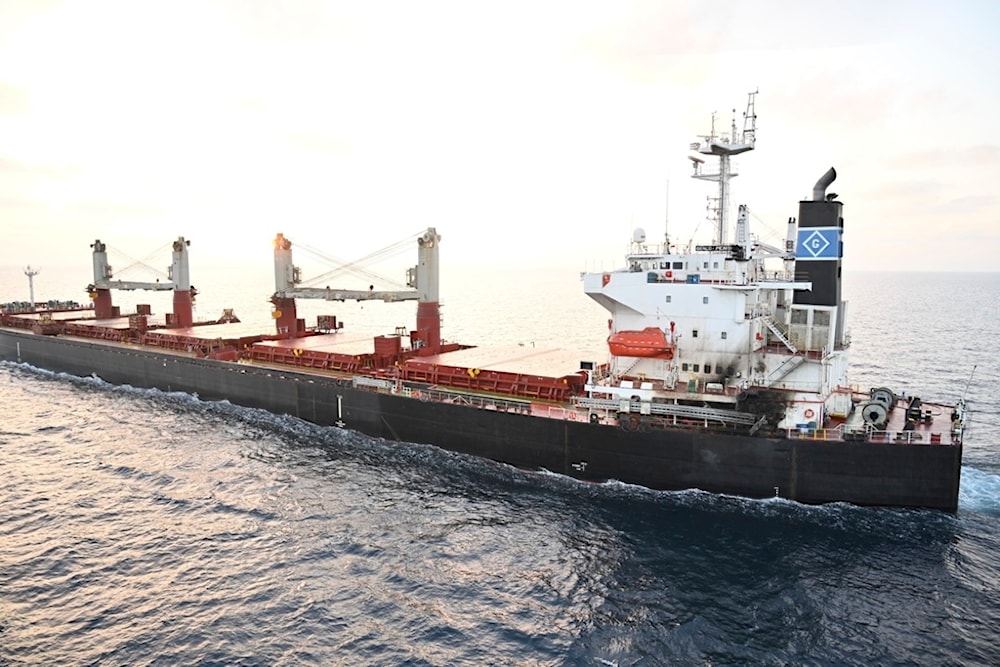US requests that China urges Iran to restrain Yemen: Financial Times
The Financial Times reports that American officials have been pressing China to convey their warnings to Iran against further exacerbating the regional turmoil.
-

This photo provided by the Indian Navy shows U.S.-owned ship Genco Picardy that came under attack by Yemeni drones in the Gulf of Aden, Thursday, Jan. 18, 2024 (AP)
According to a recent report by the Financial Times, the US has sought Chinese intervention in urging Iran to curb the Yemeni operations against Israeli and "Israel"-bound ships in the Arabian and Red Seas.
However, according to the American officials cited in the report, China has shown no signs of assistance despite the ongoing negotiations between American and Chinese officials which have lasted for three months now.
The United States has been recurrently emphasizing the graveness of the situation in the Middle East after the aggression against Gaza spilled over to different countries across the region. The Financial Times reported that American officials have been pressing China to convey their warnings to Iran against further exacerbating the regional turmoil.
Despite these efforts, officials state that there is no tangible evidence indicating that China has applied any pressure on Iran to curb the Yemeni naval operations, according to The Financial Times. The only noteworthy response from Beijing came in the form of a moderately worded statement released last week, urging "relevant parties" to ensure the safe passage of ships navigating through the Red Sea.
One official stated that the United States will continue to address the issue of Iran and Yemeni operations in the Red Sea with Beijing, but he was not particularly optimistic about a change in China's stance.
The report highlights the ongoing diplomatic efforts by the United States continues to engage with China on West Asian affairs specifically in regards to Iran and Yemen. However, optimism about a substantial shift in China's stance remains tempered among American officials.
Read more: Qatar postpones LNG deliveries to Europe as tensions rise in Red Sea
China: US-UK attacks on Yemen escalate tensions, threaten ship safety
Earlier today, China's envoy to the European Union warned that the United States and United Kingdom's military operations in the Red Sea are threatening the stability of the region more and debilitating the global supply further.
"They can only escalate the tension and it'll not guarantee or maintain the safe passage of the commercial vessels," China's top envoy Fu Cong told Bloomberg, ascertaining that this only makes sailing corridors riskier than they already are.
This comes as the US and UK launched an attack on positions in Yemen under the guise that the Yemeni Armed Forces were preparing to launch two anti-ship missiles at commercial ships in the Red Sea.
The US military claimed on Wednesday morning that its forces destroyed two anti-ship missiles in Yemen that were aimed at the Southern Red Sea and were prepared to launch.
The US Central Command (CENTCOM) said in a statement that its forces identified the missiles in areas in Yemen and determined that they "presented an imminent threat to merchant vessels and the US Navy ships in the region."
Read more: Iraqi Resistance launches Stage 2: Tightening blockade on 'Israel'
The US-UK-led coalition failed to monitor and locate the launch sites of the Yemeni Armed Forces' (YAF) anti-ship missiles launch site, a Yemeni military official told Al Mayadeen.
Coalition satellites and American spyplanes failed to locate the launch sites of missiles that targeted a US-owned Ocean Jazz cargo ship in the Gulf of Aden. It is worth noting that the ship transports US military equipment.
Explaining that the targeted locations are "insignificant", the military source said the sites house no weapons or military equipment, adding that there were no forces positioned there at the time of the aggression.
Reductive Western Policy
In a recent piece written for The Guardian explaining that Ansar Allah can't "be bombed into extinction" because of being part of a regional tenacious coalition, Amal Saad attends to the general structure of the axis of resistance.
Saad explains that the US, UK, and "Israel" are reductive in their approach to dealing with resistance. They expect that they can threaten them or bomb them into submission because they consider proxies acting according to Iranian diktats, but in fact, these resistance movements, Saad argues, have motives and interests of their own at stake in these battles. Saad reaffirms that Ansar Allah, like other resistance movements party to the Axis, is self-interested and driven by ideological motives in the burgeoning conflicts to which they're party.
What Western policy fails to grasp is that all of the resistance Axis party members are stakeholders and not just Iran. The Yemenis' blockade in the Arabian and Red Seas is driven by their ideological commitments to the Palestinian cause and their belief in their intersecting internet between Yemeni national interest and Palestinian national interest.
"This is a fundamental misunderstanding of the underlying dynamics within the axis and of the unshakeable unity of its members, all of which could make Western powers’ intervention in the region even more costly," she writes.
Read more: Eyes on the South: Low-intensity conflict & escalation-risk in Lebanon

 5 Min Read
5 Min Read








